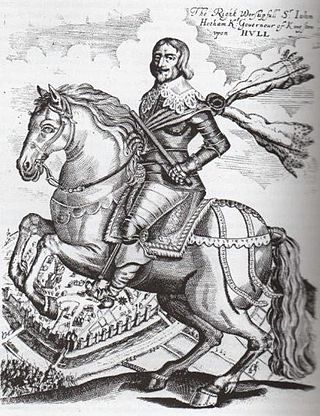Loading AI tools
English politician From Wikipedia, the free encyclopedia
Sir John Hotham, 1st Baronet (c. July 1589 – 3 January 1645) of Scorborough Hall, near Driffield, Yorkshire, was an English Member of Parliament who was Governor of Hull in 1642 shortly before the start of the Civil War. He refused to allow King Charles I or any member of his entourage to enter the town, thereby depriving the king of access to the large arsenal contained within. Later in the Civil War he and his son John Hotham the younger were accused of treachery to the Parliamentarian cause, found guilty and executed on Tower Hill.[2]




He was born in 1589[3] the second but only surviving son[4] of John Hotham (1540–1609) of Scorborough, who in 1584 had been elected a Member of Parliament for Scarborough in Yorkshire. His mother has been variously given as Julian Stanhope, a daughter of Sir Michael Stanhope of Shelford, Nottinghamshire[5] or as Jane Legard, a daughter of Richard Legard of Rysome, Yorkshire.[6]
He fought on the continent of Europe during the early part of the Thirty Years' War.[5] In 1622 he was made a baronet. He was elected a Member of Parliament for Beverley in the five Parliaments between 1625 and 1640, and served as Sheriff of Yorkshire in 1634. In 1639 he was deprived by the king of his office of Governor of Hull, and joining the parliamentary party, he refused to pay ship-money. In January 1642 Hotham was ordered by Parliament to seize the town of Hull, where there was a large store of munitions of war; this was at once carried out by his son John Hotham the younger. Hotham senior took command of Hull and in April 1642 refused to admit King Charles I to the town. Later he promised his prisoner, George Digby, 2nd Earl of Bristol, that he would surrender the town to the king, but when Charles appeared again he refused a second time and drove away the besiegers.[5]
Meanwhile, Hotham the younger was taking an active part in the Civil War in Yorkshire and Lincolnshire, but was soon at variance with other parliamentary leaders, especially with Lord Fairfax and his son Sir Thomas Fairfax, and complaints about his conduct and that of his troops were made by Oliver Cromwell and by Colonel John Hutchinson. Soon both the Hothams were corresponding with the Earl of Newcastle, and Hotham the younger was probably ready to betray Hull; these proceedings became known to Parliament, and in June 1643 father and son were captured and taken to London.[5]

After a long delay, they were tried by court-martial, found guilty, and sentenced to death. The younger Hotham was beheaded at Tower Hill on 2 January 1645, and despite efforts made by the House of Lords and the Presbyterians to save him, his father suffered the same fate on the following day. Both were buried at the nearby church of All Hallows-by-the-Tower. [8] A tomb monument was erected in his memory in St Mary's Church, South Dalton. The baronetcy passed to Sir John's grandson Sir John Hotham, 2nd Baronet, the son of Hotham the younger.
Sir John married five times and had sixteen children of whom six sons and three daughters survived childhood.[8]
In 2017, a play called The Hypocrite, written by Richard Bean was performed by the Royal Shakespeare Company at Hull Truck Theatre and Stratford. Sir John Hotham was played by Mark Addy and Lady Sarah Hotham played by Caroline Quentin.[10]
Seamless Wikipedia browsing. On steroids.
Every time you click a link to Wikipedia, Wiktionary or Wikiquote in your browser's search results, it will show the modern Wikiwand interface.
Wikiwand extension is a five stars, simple, with minimum permission required to keep your browsing private, safe and transparent.